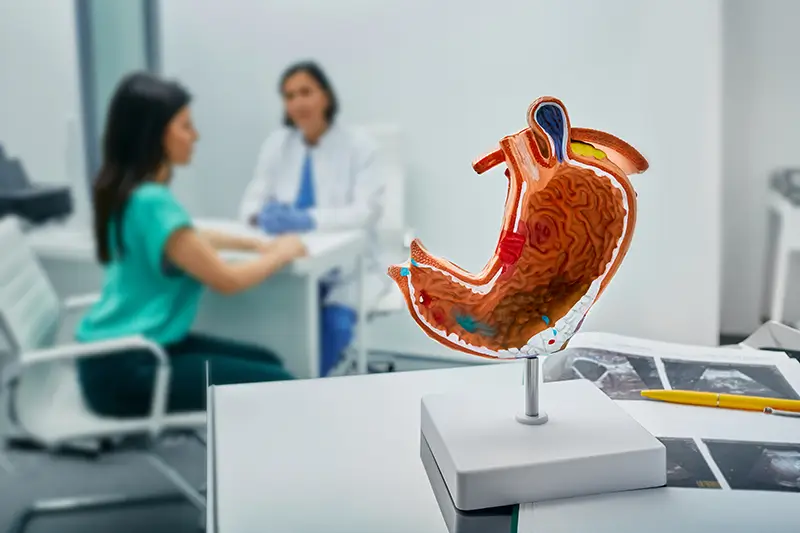Staying ahead of billing and coding changes is essential to run a successful gastroenterology practice. As a gastroenterology medical coding company, we help gastroenterologists report their services correctly using the latest codes, ensure documentation compliance, and submit accurate claims for maximum reimbursement. Gastroenterology billing and coding saw significant updates in 2024 and is on the threshold of several changes in 2025. This post provides an overview of these developments.
Reduce claim denials, and maximize reimbursements with our expert gastroenterology billing services!
Updates for Gastroenterology in 2025
The new CPT set introduces 270 new codes, along with 112 deletions and 38 revisions, many of which will directly affect how gastroenterology procedures are coded and billed. Here are key updates that will impact gastroenterology in 2025:
- Gastroenterology Care Merit-based Incentive Payment System (MIPS) Value Pathway (MVP): CMS has put forward a new MVP for gastroenterology that includes 11 MIPS quality measures and 3 QCDR measures. The MVP is intended to reduce administrative burden.
- Medicare telehealth flexibilities: CMS proposes to end COVID-19 era telehealth flexibilities, beginning January 1, 2025. This means that statutory restrictions on geography, site of service, and practitioner type will go back into effect.
- 98975 CPT Code update: The 2025 update to code 98975 will include digital therapeutic (DTx) Digital therapeutics are software-based treatments that use digital tools to help patients manage, prevent, or treat medical conditions.
- Audio-Only CPT Codes to take the place of Telephone-Only CPT Codes: There are various smartphone apps and online platforms that enable audio-only consultation. The AMA has decided to replace the “telephone-only” CPT codes – 99441-99443 with “audio-only” codes – 98012-98015.
- CPT Codes 98976–98978 update: CPT codes 98976–98978 are used to report the cost of supplies for remote therapeutic monitoring (RTM) devices that monitor specific body systems or therapies. Starting 2025, gastroenterology practitioners can charge patients for the supply of devices that facilitate data transmission.
- CPT 49186-49190 code updates relevant to gastroenterology: Changes were made to CPT’s general surgery section to reflect advancements in surgical techniques for the elimination of tumors within the abdomen (49186-49190).
- 96041, a New CPT Code for Genetic Counseling: Genetic counseling provides essential insights into how hereditary conditions can impact patients and their families. Gastroenterologists should identify patients at risk for genetic disorders and facilitate appropriate genetic counseling and testing. The new CPT code 96041 updates the previous code 96040 by removing the term “face-to-face,” allowing for the recognition of all aspects of genetic counselors’ work—not just in-person interactions. This change ensures comprehensive acknowledgment of their role in patient care.
- Physician Payment Rule (PFS): The average payment rates under the PFS will be reduced by 2.93% in 2025.
Key Gastroenterology Coding Changes 2024
The 2024 CPT codes for gastroenterology capture the rapid progress in diagnostic and therapeutic techniques within the specialty. These updates cover advances from endoscopic procedures to remote monitoring and personalized biologic treatments. Being knowledgeable about these changes can help ensure gastroenterologists deliver state-of-the-art care while receiving appropriate reimbursement for their services.
- Office visit evaluation and management (E/M) code revisions: E/M office visit CPT codes 99202-99205 and 99212-99215 were revised to remove the time “range” in minutes from each code. When reporting based on time, clinicians must meet or exceed a single “minimum time threshold” of total time on the dates of the encounter for each code.
- Revisions to split (or shared) visit rules: CPT clarified that these visits are defined by the substantive portion of the evaluation and management (E/M) service performed.
- New GI Category III CPT codes: Several GI-related Category III codes and revisions were implemented in 2024:
- 0813T Esophagogastroduodenoscopy, flexible, transoral, with volume adjustment of intragastric bariatric balloon
- 0868T High-resolution gastric electrophysiology mapping with simultaneous patient symptom profiling, with interpretation and report
- Parenthetical notation for existing code 0779T revised to include 0868T as “do not report” code: 0779T Gastrointestinal myoelectrical activity study, stomach through colon, with interpretation and report. (Do not report 0779T in conjunction with 91020, 91022, 91112, 91117, 91122, 91132, 91133, 0868T).
- 0884T Esophagoscopy, flexible, transoral, with initial transendoscopic mechanical dilation (eg, nondrug-coated balloon) followed by therapeutic drug delivery by drug-coated balloon catheter for esophageal stricture, including fluoroscopic guidance, when performed.
- 0885T Colonoscopy, flexible, with initial transendoscopic mechanical dilation (eg, nondrugcoated balloon) followed by therapeutic drug delivery by drug-coated balloon catheter for colonic stricture, including fluoroscopic guidance, when performed.
- 0886T Sigmoidoscopy, flexible, with initial transendoscopic mechanical dilation (eg, nondrugcoated balloon) followed by therapeutic drug delivery by drug-coated balloon catheter for colonic stricture, including fluoroscopic guidance, when performed.
- HCPCS code update – New G2211 add-on code for visit complexity: HCPCS add on code G2211 was introduced to better account for the resource costs associated with visit complexity inherent to primary care and other longitudinal care. Code G2211 can be submitted with E/M office or outpatient visits, 99202- 99215.
- New diagnosis codes for intestinal microbial overgrowth and SIBO: New ICD-10 codes were introduced in 2024 for intestinal microbial overgrowth under the K63.82 family, including Small Intestinal Bacterial Overgrowth (SIBO) and Intestinal Methanogen Overgrowth (IMO).
- Modifier updates: Updates were made to important modifiers used in gastroenterology billing such as modifier -33 (preventive services) and guidance on when to use modifier -59.
- Updated National Correct Coding Initiative (NCCI) Edits: 2024 updates include updated edits for colonoscopy and polypectomy services.
Gastroenterology practices should prepare for the extensive 2025 CPT code updates. Numerous updates focus on telehealth and remote therapeutic monitoring and will be particularly impactful for gastroenterologists. Leveraging gastroenterology medical billing and coding services is a practical way to navigate these additions and modifications to minimize billing and coding errors and ensure accurate reimbursement.




